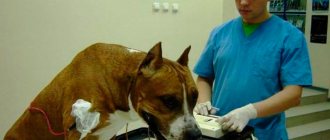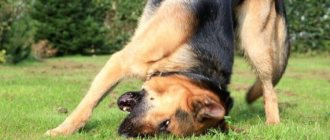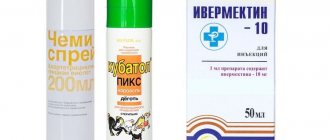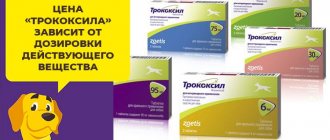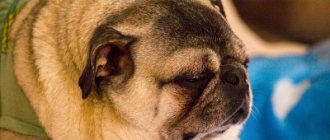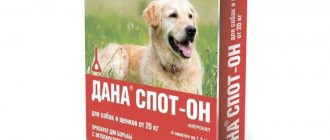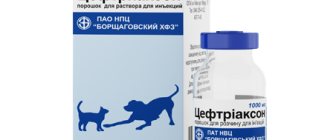Medicines
From the list provided, each owner will choose the set he needs for his dog.
Heart remedies
Caffeine - used for heart weakness, loss of strength, poisoning in a dose of 0.2-0.5 g at a time. Valerian drops are given for nervous excitement and weakened cardiac activity, 5-10 drops. Gitalen (a digitalis preparation) is used for heart failure, 1-3 ml. Adrenaline - in case of cardiac arrest, 0.3-0.5 g. Camphor oil - increases blood pressure, reduces the animal’s body temperature, 1-2 ml.
Digestive problems
Furazolidone - used for intestinal disorders. The course of treatment is 4-5 days, 0.15 g 3-4 times a day. Enteroseptol - for intestinal diseases, the course of treatment is 5-6 days, up to 3 tablets per day, depending on the severity of the disease. Phthalazole - antimicrobial effect for gastrointestinal disorders, 0.5-1 g 3-4 times a day. — Bactrim is used for hepatitis, gastrointestinal disorders, sore throat, 1 teaspoon 3 times a day. Papaverine - for spasms, colitis, 1-2 tablets 1-2 times a day. — Festal contains enzymes and is prescribed for gastrointestinal disorders. ? Potassium sulphate is used for viral hepatitis to restore liver function, 3-4 tablets per day. Liv. 52 enhances intracellular metabolism, promotes digestion. Prescribed for viral hepatitis, 3-4 tablets per day. Allochol - stimulates intestinal motility, used for hepatitis and enterocolitis, 2-3 tablets per day. — Cholenzym is involved in digestive processes, 1-3 tablets 2-3 times a day. Lactic acid is used as an anti-inflammatory and anti-fermentation agent, 0.2-0.1 g daily for 2-3 days. Acetic acid has the same effect. Sodium bicarbonate (baking soda) - used for poisoning, and also increases the secretion of gastric juice. Hydrochloric acid (pharmaceutical) is used to normalize digestion - 2-3 times a day, 1 teaspoon or 1 tablespoon. Gastric juice - used as a therapeutic and prophylactic agent for digestive disorders in young animals, 10-30 ml 1-2 times a day.
Remedies for poisoning
Copper sulfate - for poisoning with chlorophos, externally for damage with white and red phosphorus, take 1 g and dilute in a 50-fold amount of water. Burnt magnesia - for intestinal bloating, poisoning with pesticides used in agriculture, as well as for the adsorption of gases, 0.2-1 g per 50 g of water. Coal - for poisoning and swelling, used in the form of an aqueous suspension, 0.3-2 g, the dose and timing are determined by the veterinarian. Unithiol - used for poisoning with compounds of arsenic, mercury and other heavy metals, intravenously or in a 0.85% solution of table salt - 0.05 g per 1 kg of weight. Injections are given every 5-6 hours for 1-2 days, then 1 injection for 3-10 days. Laxatives
Castor oil - given for inflammation of the stomach and intestines, for overfeeding - 15-50 g. Magnesium sulfate (bitter salt) - 2-3 g diluted 5-10 times with water. Glauber's salt - 10-25 g diluted 8-15 times with water. When used at 0.2-1 g per day, it improves digestion.
What medications can be given to dogs for treatment?
Adsorbents: activated carbon; smecta (has adsorbent and astringent properties, also helps with diarrhea; 1 sachet of smecta should be diluted in 1/3 cup of lukewarm water and given to the dog); phosphalugel; enterosgel; enterodesis.
To normalize the flora of the gastrointestinal tract: hilakforte; bifitrilak; lactobifidol.
Antihelmintics: drontal; cestal plus; vacation
Ointments: synthomycin; levomekol; Metrogil denta; tetracycline (3% and 1%; eye ointment); panthenol spray.
Antihistamines: diphenhydramine (tablets and ampoules); tavegil (tablets); suprastin (tablets).
Antispasmodic - no-spa (ampoules, tablets; dosage: can be diluted with baralgin 1/1 or 1/0.5). Dosage: 1/8-1/10 tablets for toy breeds, for a medium dog (for example, a German shepherd weighing 20-25 kg) 1 tablet 2-3 times a day.
Eye drops: “Iris” (veterinary); garazon; chloramphenicol.
Heart medications for the treatment of dogs: cordiamine; sulfocamphocaine (subcutaneous). Hemostatic drug - dicinone (intramuscular).
Diuretic drug - furosemide, or Lasix (1 ampoule or 1 tablet).
Special lotion for washing ears.
A calming drug - valerian drops (given when the dog is nervous and has weakened cardiac activity; 5-10 drops no more than 2-3 times a day).
A hemostatic sponge is applied to bleeding wounds, stops the bleeding and glues the edges of the incised wound. There is no need to remove it - it completely dissolves. It comes in different sizes; with the help of scissors you can give it the desired size and shape.
Antibiotics
Penicillin is used for mastitis, sepsis, high fever, and colds from 10,000 to 20,000 units per 1 kg of body weight intramuscularly. Biovitin - for dyspepsia, 0.1-0.12 g per 1 kg of body weight 2 times a day. Biovit-40 is prescribed for acute gastrointestinal disorders accompanied by diarrhea, 0.8-1.0 g per day for 5-10 days, as well as to stimulate the growth of young animals. Ampicillin is a bactericidal agent that, unlike penicillin, has an effect on pathogens of intestinal infections. It should be used as directed by a veterinarian. Streptomycin sulfate - intramuscularly for pneumonia, mastitis, inflammation of the respiratory system, 10,000-15,000 units per 1 kg of weight. Streptomycin and kanamycin are given for plague and gastrointestinal diseases in doses prescribed by the veterinarian. Bicillin-3 is administered after 3 days on the 4th, 10,000 units per 1 kg of weight. The course of treatment is usually 3-7-30 days. Bicillin is available in three dosage forms: bicillin-1, bicillin-3, bicillin-5 (intramuscular injection only). Add 2-3 ml of distilled water into a bottle with bicillin and shake to obtain a homogeneous mass. Gramicidin has a bactericidal effect and is used to treat purulent wounds. Doses are prescribed by a veterinarian. Gentamicin is used for urinary tract infections (pyelonephritis, cystitis, urethritis), pleurisy, sepsis, digestive infections, peritonitis. Tetracycline is used for infectious gastric diseases, pneumonia 4-6 times a day, 0.2-0.3 g. At the same time, vitamins B, C and P are prescribed. Dogs taking tetracycline should be protected from direct sunlight, and should also refrain from giving it pregnant bitches, since tetracycline passes through the placenta and destroys the tooth enamel of embryos. Levomycetin is used for gastric disorders, sepsis, pneumonia, bronchopulmonary inflammation. Because of the bitter taste, it is recommended to wrap this medicine in minced meat. Ampiox - due to its wide therapeutic possibilities, it is used as a first-line antibiotic, used for pneumonia and sepsis.
Indications for use
Does your dog have digestive problems?
Yes
90.6%
No
9.4%
Veterinarians and breeders recommend a course of probiotics for animals in the following cases:
- changing the type of food or switching to a new food;
- restoration of intestinal microflora after antibiotics or anthelmintics;
- prevention and treatment of infectious diseases (parvovirus enteritis, hepatitis, salmonellosis, etc.);
- vaccination period;
- helminthic infestations;
- after surgical interventions;
- food poisoning;
- allergic reactions;
- prevention of stress reactions (exhibitions, moving);
- gastrointestinal diseases as part of complex therapy (gastroenteritis, pancreatitis, colitis);
- feeding puppies or switching to artificial feeding;
- Digestive disorders accompanied by diarrhea or constipation in dogs.
Probiotics prevent the development of dysbiosis against the background of the above factors. Biologics are also used to treat dysbiosis and enhance the body's immune response.
Hormonal drugs
Adrenaline hydrochloride has an antiallergic and vasodilating effect. Used for shock, collapse as a result of bleeding. Ambosex - stimulates sexual desire and potency, used for sexual disorders in male dogs. Doses are prescribed by a veterinarian. Serum gonadotropin - stimulates spermatogenesis in males, i.e. helps with infertility. Doses are prescribed by a veterinarian. Chorionic gonadotropin (choriogonin) is used for bilateral cryptorchidism and infertility in male dogs. Doses are prescribed by a veterinarian. Methandrostenolone (Nerobol) stimulates protein synthesis, improves appetite and sexual function, and increases body weight. Doses are prescribed by a veterinarian.
Biogenic stimulants
Apilak - has a tonic and antispastic effect. Used for sexual dysfunction and as a prophylactic to increase appetite, 1-2 tablets 1-2 times a day. Aloe extract - increases the overall tone of the body, and is also used for chronic inflammatory processes in the genitals. Administer 1-2 ml subcutaneously or intramuscularly every other day. FIBS accelerates wound healing and has a stimulating effect on the body. Doses are prescribed by a veterinarian. Ginseng tincture has a stimulating and general tonic effect on sexual function. Prescribe 10-20 drops 2-3 times a day for 2-3 weeks. It should be remembered that with an overdose, an increase in heart rate is observed. Motherwort tincture has a calming effect on the central nervous system. Prescribe 30-40 drops 2-3 times a day. Eleutherococcus extract has a stimulating effect. Dose: 5-25 drops before meals. Belladonna tincture has an analgesic and antispasmodic effect. Dose: 10-30 drops 2-3 times a day. Trioxazine is used for sexual neuroses in male dogs. It does not cause drowsiness, lethargy and lethargy, and is low-toxic. Give 0.25-0.30 g (1 tablet) 1-2 times a day. But it is not recommended to give it 15-18 days before mating. Before therapeutic enemas, a cleansing enema is given 30 minutes before. The therapeutic enema is administered very slowly. It can be administered up to 3 times a day.
Medications and remedies for the stomach and gastrointestinal tract for dogs
- Anesthesia and sedatives
- For eyes
- For the stomach and gastrointestinal tract
- For immunity
- For skin
- For the liver
- For the oral cavity
- For the kidneys
- For the cardiovascular system
- For joints
- For the ears
- Anti-inflammatory and painkillers
- Wound healing agents
- Universal
- show all
- Hide
Filter
Show by: 10 30 50
20 products Sort by:
- New
VETOM 2 antiviral drug for the prevention and treatment of gastrointestinal diseases 50 g(0) Quick view
Weight Price Buy 1 PC 168 Buy
- New
VETOM 2 antiviral drug for the prevention and treatment of gastrointestinal diseases 5 g
(0) Quick view
Weight Price Buy 1 PC 17 Buy
- ENTEROZOO suspension for poisoning and diseases of the gastrointestinal tract 15 g x 10 pcs
(0) Quick view
Weight Price Buy 1 pack 354 Buy
- VERACOL homeopathic medicine for the treatment of inflammatory diseases of the gastrointestinal tract 20 ml solution for oral use
(0) Quick view
Weight Price Buy 1 PC 266 Buy
- VERACOL homeopathic medicine for the treatment of inflammatory diseases of the gastrointestinal tract 10 ml injection solution
(0) Quick view
Weight Price Buy 1 PC 303 Buy
- VERACOL homeopathic medicine for the treatment of inflammatory diseases of the gastrointestinal tract 100 ml injection solution
(0) Quick view
Weight Price Buy 1 PC 1052 Buy
- ACYLOK 25 mg/ml drug for the treatment of peptic ulcers of the gastrointestinal tract 2 ml x 10 ampoules injection solution
(0) Quick view
Weight Price Buy 1 pack 372 Buy
- GIGI VETSORBIN drug for dogs and cats to normalize the activity of the gastrointestinal tract
(0) Quick view
Weight Price Buy 80 tablets 995 60 tablets 269 Buy
- DIARKAN sugar cubes for diarrhea for dogs and cats
(0) Quick view
Weight Price Buy 1 PC 537 Buy
- PANCREALEX homeopathic medicine for the treatment of diseases of the gastrointestinal tract, injection solution
(0) Quick view
Weight Price Buy 10 ml 337 Buy
- ENTEROZOO suspension for poisoning and diseases of the gastrointestinal tract
(0) Quick view
Weight Price Buy 100 gr 266 Buy
- LIARSIN homeopathic medicine for the prevention and treatment of chronic diseases with metabolic disorders and gastrointestinal tract functions drops
(0) Quick view
Weight Price Buy 20 ml 318 Buy
- BIOCORRECTOR RD food additive for dogs for the prevention of diseases of the gastrointestinal tract, increasing immunity and allergies
(0) Quick view
Weight Price Buy 90 tablets 144 Buy
- PRO-KOLIN feed additive for the correction of digestive system disorders
(0) Quick view
Weight Price Buy 30 ml 1141 15 ml 845 Buy
- LIARSIN homeopathic medicine for the correction of metabolic processes, prevention and treatment of diseases of the gastrointestinal tract, injection solution
(0) Quick view
Weight Price Buy 10 ml 317 Buy
- VETOM 3 antiviral drug for the prevention and treatment of gastrointestinal diseases
(0) Quick view
Weight Price Buy 50 gr 166 5 g 17 Buy
- New
FITODOC ENTEROSPAS feed additive for animals to normalize digestion processes. 10 pieces
(0) Quick view
Weight Price Buy 1 PC 467 Buy
- New
VETOM 1.2 antiviral drug for the prevention and treatment of gastrointestinal diseases
(0) Quick view
Weight Price Buy 50 gr 168 5 g 15 Buy
- New
VETOM 1 antiviral drug for the prevention and treatment of gastrointestinal diseases 50 g
(0) Quick view
Weight Price Buy 1 PC 149 Buy
- KATOZAL 10% drug for stimulation of metabolic processes, solution for injection
(0) Quick view
Weight Price Buy 100 ml 968 Buy
Show by: 10 30 50
Sort by: price name
Some certificates of goods presented in our catalog.
Antihelminthics
Piperazine is used for ascariasis, 1-4 g 2-3 times a day for 3 days, then repeat after 5 days. Mebendazole (Vermox) - used for infection with nematodes and cestodes, contraindicated in pregnant bitches. Apply 2.5-5 mg/kg body weight once, repeat after 3 days. Levomizole (decaris) is given for ascariasis as a single dose of 2.5 mg/kg once, in case of severe infection it is repeated after 2-3 weeks. Kombantrin (pyrantel) is a remedy against pinworms and roundworms. Give 5-10 mg/kg once, in case of severe infection, repeat after 2-3 weeks. Eating pumpkin seeds requires a diet and a cleansing enema. For prevention, you can give several pumpkin seeds daily and 1-3 cloves of garlic weekly.
Antiemetics (medicines) for dogs
An antiemetic drug for dogs that can be used without a veterinarian’s prescription is cerucal (tablets and ampoules; active ingredient is metoclopramide). For dogs, the average single dose is 0.5-0.7 mg per 10 kg of body weight. It is possible to take this medicine for dogs 2-3 times a day. The maximum daily dose is 1-2 mg per 10 kg of body weight. The average course of treatment is 5-7 days. Since the drug has a rather severe effect on the body, try to avoid long-term use if possible.
For other antiemetics for dogs, consult your veterinarian.
Astringents, coatings and carminatives
White clay acts as an adsorbent and enveloping agent. It is prescribed in an aqueous solution of 20-30 g before meals. Almagel is a good enveloping agent; it is prescribed 1 teaspoon - 1 tablespoon before meals. Bismuth nitrate is an astringent and antiseptic, give 1 teaspoon - 1 tablespoon 3-5 times a day. Starch in hot water forms a colloidal solution, reduces irritation of the mucous membranes and improves digestion. Prescribed as an enveloping agent orally, 1/3-1/2 cup 3-5 times a day and in the form of enemas.
Dosage
Zoocard is produced in the form of tablets and suspensions. Tablets are available in several types and contain different amounts of active substance.
The medicinal product for small breed dogs contains 1.2 mg of ramipril, 1 tablet is used per 10 kg of animal weight. It should be given to the pet once a day, with food or forcefully, using a tablet dispenser.
The standard course of treatment is 3-4 weeks. The veterinarian will draw up an exact scheme after a thorough examination of the animal.
For medium-sized dogs, the content of ramipril in 1 tablet is 2.4 mg, the dosage is calculated as follows:
1 tablet per 20 kg of animal body weight. Large animals are given 1 tablet containing 4.8 mg of ramipril per 40 kg of body weight. This allows you not to exceed the established doses and get the maximum therapeutic effect from taking Zoocard.
The suspension is given using a dispenser syringe. An individual treatment regimen is drawn up by a veterinarian; you should purchase medicine for the desired category at the pharmacy:
- small breed dogs;
- medium animals;
- large.
Important! Animals weighing more than 50 kg can be given the medicine in two doses, the rest - once a day.
Herbs
It is good to treat pets with medicinal herbs. Their effect is milder than the effect of tablets, powders, and injections. Well-known teas and infusions help both people and dogs. The technology for their preparation is simple.
The collections are used for internal and external use. Depending on the method of application, fees are divided into several types.
Collections for poultices, or emollients (the size of the crushed plant parts does not exceed 1.5 mm); they are mixed with hot water to the consistency of porridge, wrapped in linen and applied to the skin.
Collections for dry poultices (the size of the crushed parts does not exceed 2 mm), are used moderately heated, wrapped in cloth.
Collections for preparing an infusion or decoction are the most common (the size of the crushed parts does not exceed 4-6 mm). They are brewed and infused at home and consumed immediately.
The composition of the mixtures can be simple (teas) or complex, consisting of a mixture of several plants that are similar in their effect on the body, which allows increasing the therapeutic effect. But there are mixtures in which some herbs expand and complement the action of others, and sometimes act oppositely.
Tinctures are usually made with vodka or 70% alcohol. The crushed raw materials are poured into a glass jar, filled with alcohol of the appropriate strength, tightly closed with a lid and kept for 7 days in a dark place at room temperature. Then the tincture is filtered.
Juices are a liquid dosage form prepared from fresh raw materials. Fresh juices are prepared by passing clean, washed plant parts through a juicer or meat grinder. The resulting pulp is squeezed through a cloth. This juice contains all the water-soluble healing components of plants.
Powders are well-dried and crushed raw materials. They are taken by mixing with a small amount of water or milk. The raw materials are ground into powder in a mortar or kitchen mill.
Hemostatic tea (for internal bleeding) is obtained from the root of burnet. Give in the form of a decoction (1.5:20) one tablespoon 4-6 times a day for diarrhea and as a hemostatic agent for pulmonary and scrotal bleeding.
These three infusions are used as expectorants:
Birch buds. Brew a teaspoon of dry buds as tea in half a glass of boiling water and drink throughout the day. St. John's wort herb. Used internally in aqueous extract for respiratory diseases. Great plantain leaves. Brew dry leaf tea and give one tablespoon 3-5 times a day. Marshmallow root - 2 parts, coltsfoot leaves - 2 parts, oregano herb - 1 part. Pour one tablespoon of the mixture into a glass of boiling water and leave for 20 minutes. Give half a glass warm after meals 3-4 times a day for respiratory diseases.
Hawthorn flowers - 1 part, valerian root - 1 part, adonis herb - 1 part. Pour one tablespoon of the mixture into a glass of boiling water and leave for 30 minutes. Give a third of a glass 3 times a day when cardiac activity weakens.
For diseases of the gastrointestinal tract, the following fees are used:
Wormwood grass - 3 parts, millennial grass - 1 part. Pour one tablespoon of the mixture into a glass of boiling water and leave for 20 minutes. Give a tablespoon 15-20 minutes before meals. This remedy stimulates the appetite. Wormwood herb - 1 part, centaury herb - 1 part, mint leaves - 1 part, dandelion root - 1 part. Pour one tablespoon of the mixture into a glass of boiling water and leave for 20 minutes. Drink a tablespoon 15-20 minutes before meals. Used for intestinal disorders. Bird cherry fruits - 3 parts, blueberries - 2 parts. Pour one tablespoon of the mixture into a glass of boiling water and boil for 20 minutes. Give 1/4-1/3 cup 3-4 times a day before meals. Give for intestinal disorders. Strawberry leaves. Prepare an infusion (1:10) and drink 1 tablespoon 3-5 times a day for intestinal upset. Mint leaves - 2 parts, valerian root - 2 parts, fennel fruits - 1 part. Pour two teaspoons of the mixture into a glass of boiling water and leave for 20 minutes. Give 1 glass in the morning and evening. Helps with constipation. Mix equally marigold flowers, blackberry leaves, mint leaves. Pour one tablespoon of the mixture into a glass of boiling water and leave for 30 minutes. Drink half a glass 3 times a day before meals for enteritis. Fees that affect milk production:
Mix one part each of anise and fennel seeds. Pour one tablespoon of the mixture into a glass of boiling water and leave for 30 minutes. Walnut leaves - 1 part, hop cones, sage leaves - 2 parts each. Pour one tablespoon of the mixture into a glass of boiling water and leave for 1 hour. These mixtures are given orally 1/2-3/4 cup 2-3 times a day to reduce milk secretion. Strawberry leaves - 1 part, 2 parts each of nettle and birch leaves, 5 parts flaxseed. Pour one tablespoon of the mixture into a glass of boiling water, boil for 10 minutes, leave for 30 minutes. Drink 1/3-1/2 cup warm 3-4 times a day before meals for pyelonephritis.
Take equal parts of mallow leaves, steelweed root, violet herb, elderberry flowers, goldenrod herb, quince seeds, juniper fruits. Pour one tablespoon of the mixture into a glass of boiling water, boil for 10 minutes, leave for 1 hour. Give 1/3-1/2 cup 3-4 times a day before meals for chronic nephritis.
Collections of vitamin plants:
Take dried rose hips and currants in equal parts. Pour one tablespoon of the mixture into two glasses of boiling water, boil for 10 minutes, leave for 2 hours in a well-sealed container. Drink half a glass 3 times a day. Take equal parts of dried rose hips and rowan berries. Pour one tablespoon of the mixture into two glasses of boiling water, boil for 10 minutes, leave for 4 hours in a well-sealed container. Give half a glass 3 times a day. Rose hips - 3 parts, lingonberry fruits - 1 part, nettle leaves - 3 parts. Brew one tablespoon of the mixture with two glasses of boiling water, boil for 10 minutes, leave for 4 hours in a tightly sealed container. Give half a glass 3 times a day. Rose hips - 3 parts, currant fruits - 1 part, nettle leaves - 3 parts, carrot root - 3 parts. Brew one tablespoon of the collection with two glasses of boiling water, boil for 10 minutes, leave in a well-sealed container for 4 hours. Give half a glass 3 times a day. Herbal infusions used for skin diseases:
Take equal amounts of chamomile flowers and sweet clover herb. Pour boiling water over two-thirds of a tablespoon of the mixture until a paste forms, wrap in a cloth. When hot, apply to the sore spot as an emollient poultice. Horsetail herb - 3 parts, chamomile flowers - 3 parts, St. John's wort herb - 4 parts. Pour one tablespoon of the mixture into a glass of boiling water, boil for 10 minutes, leave for 1 hour. Take 1/4-1/3 cup 3 times a day; use for compresses in the treatment of difficult-to-heal wounds. Take equal parts of willow bark and burdock roots. Pour four tablespoons of the mixture into 1 liter of boiling water, boil for 10 minutes, leave for 30 minutes. Use for hair loss, dandruff, itchy skin. Mix equal parts of geranium herb and nettle herb. Pour four tablespoons of the mixture into 1 liter of boiling water and leave for 30 minutes. Use as an external remedy for hair loss. Oak bark. Pour a tablespoon of coarsely crushed bark into a glass of boiling water and boil for 10 minutes. Use for lotions. (https://www.sammy.ru/aptechka.php)
Composition and action
The heart drug is based on the substance ramipril. It is known as a potent ACE (angiotensin-converting enzyme) inhibitor. Ramipril helps reduce preload on the myocardium and improve blood circulation. It gently reduces total vascular peripheral resistance without affecting heart rate.
Ramipril has cardio- and angioprotective, as well as anti-atherosclerotic effects. In addition to it, the drug contains the amino acid L-carnitine and a natural component - royal jelly. They restore cerebral vascular tone and have the following therapeutic effects:
- antihypoxic;
- antioxidant;
- vaso-strengthening.
Thanks to the use of the drug, the pressure in the pulmonary capillaries decreases and endurance to exercise increases. In case of chronic heart failure in animals, Zoocard reduces the risk of sudden death and stops the progression of the disease. The risk of myocardial infarction and stroke is significantly reduced, as is the risk of developing nephropathy - impaired renal function. The drug has a hypotensive effect, which develops within 1-2 hours after taking the drug and persists throughout the day.
The amino acid L-carnitine plays an important role in myocardial energy metabolism. It maintains normal cardiac activity in animals by providing the heart with the necessary energy. Due to the presence of L-carnitine in the preparation, the pet's body's endurance increases during increased physical activity.
Follow us
Find out more about your animal's personality on our social networks
The third active component of Zoocard is royal jelly. A biogenic stimulant helps restore blood supply to the heart during painful attacks of angina pectoris, relieves heaviness in the cardiac region during chronic heart failure. It has a general strengthening effect on the pet’s body as a whole, normalizes metabolism, improves immunity and promotes the rapid recovery of the animal’s body after painful conditions.
After taking Zoocard, the active components are quickly absorbed into the blood, reaching maximum concentration in plasma within 1-4 hours. The drug is considered low-hazard and has no contraindications for use in cases of kidney and liver pathologies.



